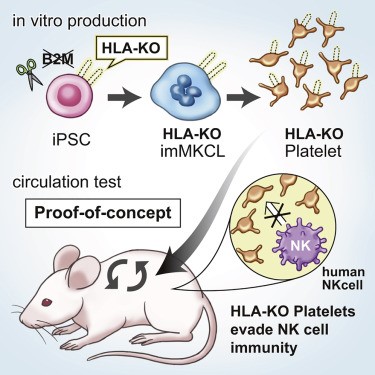- HOME
- News & Events
- Publications
- 【Publications】iPSC-Derived Platelets Depleted of HLA Class I Are Inert to Anti-HLA Class I and Natur...
Publications
【Publications】iPSC-Derived Platelets Depleted of HLA Class I Are Inert to Anti-HLA Class I and Natural Killer Cell Immunity
January 6 2020
Hitoshi Takizawa
Paper information
Suzuki D, Flahou C, Yoshikawa N, Stirblyte I, Hayashi Y, Sawaguchi A, Akasaka M, Nakamura S, Higashi N, Xu H, Matsumoto T, Fujio K, Manz MG, Hotta A, Takizawa H, Eto K, Sugimoto N
Stem Cell Reports. 2019 Dec 13. pii: S2213-6711(19)30414-X. doi: 10.1016/j.stemcr.2019.11.011.
DOI: https://doi.org/10.1016/j.stemcr.2019.11.011
PMID: 31883921
Highlights
• Clinically applicable iPSC-derived HLA class I knockout platelets (HLA-KO iPLATs)
• HLA-KO iPLATs do not elicit NK cell activation in vitro
• HLA-KO iPLATs circulate comparably with wild type in human NK cell-reconstituted mice
• HLA-KO iPLATs circulate competently in alloimmune PTR model mice
Abstract
The ex vivo production of platelets depleted of human leukocyte antigen class I (HLA-I) could serve as a universal measure to overcome platelet transfusion refractoriness caused by HLA-I incompatibility. Here, we developed human induced pluripotent cell-derived HLA-I-deficient platelets (HLA-KO iPLATs) in a clinically applicable imMKCL system by genetic manipulation and assessed their immunogenic properties including natural killer (NK) cells, which reject HLA-I downregulated cells. HLA-KO iPLATs were deficient for all HLA-I but did not elicit a cytotoxic response by NK cells in vitro and showed circulation equal to wild-type iPLATs upon transfusion in our newly established Hu-NK-MSTRG mice reconstituted with human NK cells. Additionally, HLA-KO iPLATs successfully circulated in an alloimmune platelet transfusion refractoriness model of Hu-NK-MISTRG mice. Mechanistically, the lack of NK cell-activating ligands on platelets may be responsible for evading the NK cell response. This study revealed the unique non-immunogenic property of platelets and provides a proof of concept for the clinical application of HLA-KO iPLATs.

